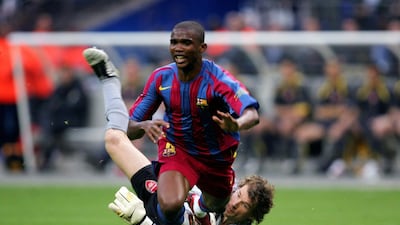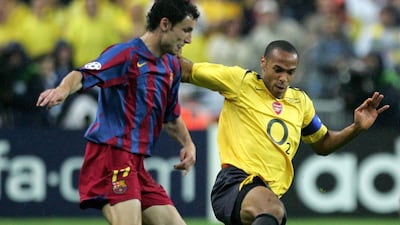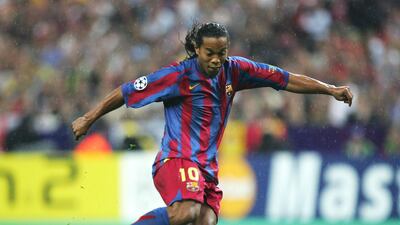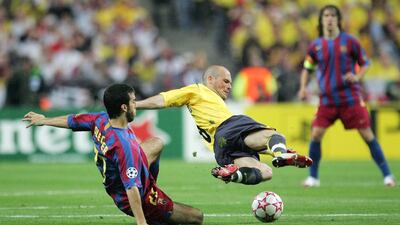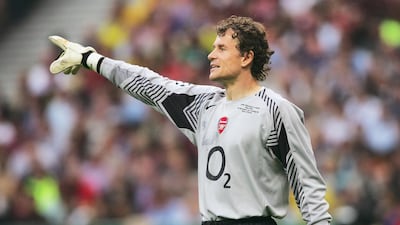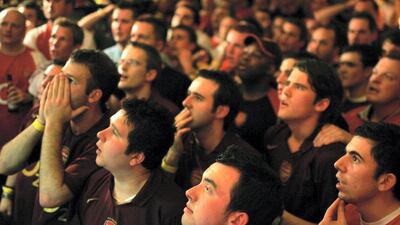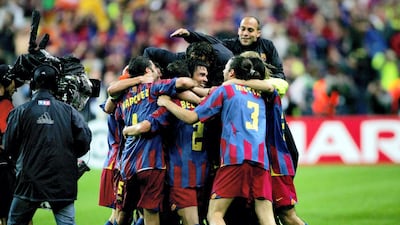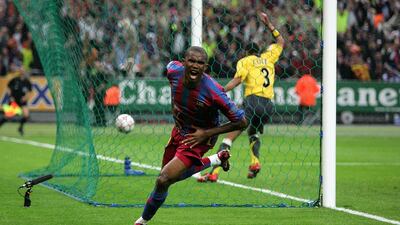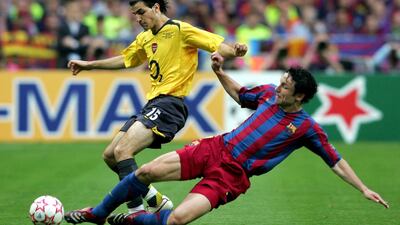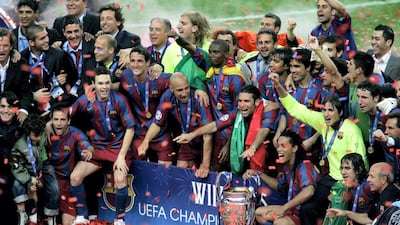Despite appearing in five previous finals, Barcelona had only ever won one European Cup, while Arsenal were appearing in their first when the pair met in Paris for the 2006 Champions League final.
Both teams won their qualification groups with huge 16 point tallies, before Barca knocked out Chelsea in a tie where Lionel Messi burst into the British consciousness at Stamford Bridge. The Catalans also defeated Benfica and AC Milan.
Arsenal eliminated Real Madrid – beating them 1-0 in the Bernabeu – Juventus and Villarreal. The Gunners’ best player, Thierry Henry, was continually linked with a move to Barcelona, whom he would eventually join, but not after several twists.
Barca were favourites. Managed by Frank Rijkaard, their line-up was Victor Valdes, Oleguer, Rafael Marquez, Carles Puyol, Giovanni Van Bronkhorst, Edmilson, Deco, Mark van Bommel, Ludovic Giuly Giuly, Ronaldinho, and Samuel Eto’o, with Xavi Hernandez, Andres Iniesta and Henrik Larsson on a bench which Lionel Messi didn't make.
But as the eventual man of the match Eto’o said before the game: “People say that we’re the best team in Europe, but we haven’t proved it yet. The ambience is perfect. We have a good mixture of all nationalities and I see that as a good thing. We are all ingredients in the mix, and good ingredients make the best food. We enjoy being together; it doesn’t matter where we come from.
“I’ve never played with a team so together as Barca is at the moment. This is just the basis of good play. We kid around like in any other locker room. We had a great team spirit when I was at Mallorca, but we never had a team that could have won the Champions’ League. Just to reach the Champions’ League with Mallorca was a great, great achievement – probably my best in football until now.”
Arsenal started with Jens Lehmann, Emmanuel Eboue, Kolo Toure, Sol Campbell, Ashley Cole, Robert Pires, Gilberto Silva, Cesc Fabregas, Alexander Hleb, Freddie Ljungberg and Henry. Jose Antonio Reyes, Mathieu Flamini and Manuel Almunia would come off the bench.
Playing a 4-5-1 to counter their opponents’ 4-3-3, Arsenal were the better team early on, exposing full-back Oleguer's lack of pace. Henry had chances.
Referee Terje Hauge, a replacement for Ole Hermann Bogan who was removed from the game after wearing a Barcelona shirt in a Norwegian newspaper, made a huge, defining decision after 18 minutes.
______________________
The long read: how player power and politics made for a perfect storm at Barcelona
______________________
Goalkeeper Lehman became the first player to be sent off in a European Cup final after bringing down Eto’o outside the box. Guily had continued and put the ball in the net, but play had been stopped. Pires was taken off and reserve goalkeeper Almunia took his place.
Ten-man Arsenal then took the lead, Campbell heading in after 37 minutes. Barcelona tried to respond, Eto’o hitting the post just before half time, when Iniesta came on for Edmilson.
“A very difficult game for us in Paris,” Iniesta told me recently. “We were 1-0 down at half time but Arsenal had a player less. We had a lot more of the ball in the second half but Victor Valdes had to make crucial saves. It was very hard for us."
Iniesta was the first Barca player to have a shot on target in the second half, but with 15 minutes to play, Arsenal still held onto their lead. Larsson and Juliano Belletti had been brought on for Barca, but Henry had another chance to score before striking the ball straight at Valdes.
Finally, after 76 minutes, Iniesta passed to Larsson who released Eto’o to equalise. Barca were buoyant and Larsson played his part in their winner four minutes later, playing a one-two with Belletti, with the Brazilian full-back shooting through Almunia’s legs.
As Barca celebrated, Henry was furious with the referee and the Barca players.
“I was kicked all over the place,” the Frenchman, who had hoped to lift the European Cup in his home city, complained afterwards. “I expected the referee to do his job. I don’t think he did.”
Henry did praise Larsson for his game changing contribution, saying: “People talk about Ronaldinho, Eto’o, Guily and everything, but I didn’t see them today. I saw Henrik Larsson. He came on; he changed the game, that is what killed the game.
"You have to remember that Barcelona is a team. It’s not Eto’o, it's not Ronaldinho. The man who made the difference was Henrik Larsson. You have to give him credit for that because when he came on he made some amazing runs around the box and he showed he is a team player. You saw two times he fed the ball back to people. He did that against us, even though their first goal was a close offside decision.”
Henry then ignored a chance to sign for Barca as he committed to Arsenal again – at least for a year.
In Barcelona, since an allocation of 21,000 tickets hardly sated demand from Barca’s 141,000 members, 12,000 watched a giant screen in the Mini-Estadi, home of Barca’s reserves, while the rest jammed bars until it was time to celebrate. The parties extended well beyond Catalonia.
In Madrid, impish Barca fans danced around the Cibeles fountain – where more successful Real Madrid sides usually rejoiced. "Was it a party or provocation?" screamed the front page of Marca, the pro-Madrid daily. Certainly, you couldn't have imagined Liverpool fans in Manchester's Albert Square after their success last year.
Elsewhere in Spain, 2,000 partied in Cordoba, 5,000 in Murcia and 3,000 in Palma de Mallorca. Smaller gatherings occurred in Barca’s 1,638 supporters’ clubs stretching from Cadiz to Cuba. Keen to emphasise the Catalans’ global appeal, newspapers printed photos of fans in Beijing and the Gaza Strip.
It would be the first of four Champions League successes for Barca in a decade and Messi would become a global superstar. Arsenal reached the semi-final in 2009 but that’s as far as they’ve got since.
